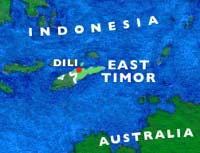|
|
|
|
 |
|
East Timor: Timor Verde Project
 |
 |
 |
East Timor covers half of a 300-mile-long coral island, and is the world's youngest nation state. |
Manual for parish environmental action
In this strongly Catholic country, the aim is to improve environmental knowledge amongst parishioners through faith based education, and through practical schemes to improve the extensive areas of degraded land in the villages around the parishes.
ARC is giving support to produce an environmental manual that can be used as an effective resource among parishes, arising from the experience and results of the pilot project described below.
Re-building community resources
When Portugal withdrew in the mid-1970s, East Timor became a disputed territory. After 25 years of civil war Indonesian forces withdrew in 1999, and East Timor became an independent nation state with the support of the UN. Now a huge range of work needs to be done to re-build and strengthen local organisations so they can care for their environment.
Pilot project
1. Co-ordination and consultation with parish priests and committees raised awareness and gave permission for technical surveys. These surveys established the status and condition of the land prior to implementing the scheme. 2 parishes and 2 districts were chosen for the pilot project.
2. Caritas Dili organised a workshop for all project partners to engage the community in the maintenance and management of conservation activities. This meeting combined religious and scientific discussion with the aim of increasing the livelihood of the villagers and improving the bio-diversity of the selected areas.
3. Haburas Foundation are organising the training of environmental education and have formed 2 working groups with 30-40 local people in each group. They have already had a 3 day training workshop in the pilot areas. The technical focus was on agro-forestry techniques and the religious focus was on Christian responsibility and action in relation to ecology. ETFOG are supplying 5.400 plant seedlings for the implementation of the plant program. They are facilitating this by identifying plant priorities according to location. They are discussing the preparation of long term agreements with the Church for the management of the project, the fair division of plant, wood and animal products, and negotiating measures to prevent illegal burning.
Structure and evaluation
The project is co-ordinated by Caritas Dili (supported by CAFOD), the Haburas Foundation, and ETFOG (East Timor Forestry Group) and backed by the Government forestry department. The Haburas Foundation – Haburas means 'to make green and fresh' – is the East Timor’s first environmental group, which has successfully pressed for environmental and sustainable-development principles to be included in the country's new constitution.
The steering committee allocates appropriate supervisory and evaluation roles amongst the partners, and as a body they support the community working groups that have been formed in each Catholic parish. Monitoring and evaluation is being shared amongst the project partners who are also taking an active role in the materials and activities of POKYA, the parish working groups.
links:
CAFOD
Caritas Dili
|
 |
|
|
|
|
|
 |
December 3, 2010:
Nigerian religious leaders unite in London to address environmental crisis
Four senior Christian and Muslim leaders from Nigeria will come to the UK next week for a high profile meeting with senior British Bishops, other faith leaders and politicians to discuss the key faith role in the environment in Africa. |
 |
ARC and the Faiths
Faith communities are working in countless ways to care for the environment. This section outlines the basics of each faith’s history, beliefs and teachings on ecology. |
 |
 |
|
|

